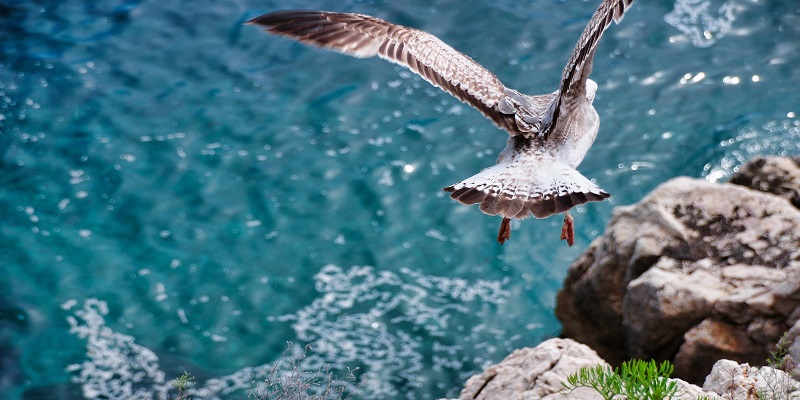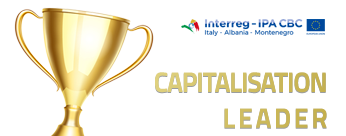
The Ministry of Economic Development and Tourism of Montenegro welcomes the successful results of a long-lasting effort, which, in cooperation with Italian and Albanian NEST partners, brought to strengthen micro, small and medium-sized tourism enterprises and entrepreneurs and to improve their capacities to create innovative tourism offers/services in the cross-border area.
Most of the world’s businesses are small, and also in Montenegro, 99% of all enterprises are micro, small, and medium-sized enterprises (MSMEs). According to the latest data for 2022, Montenegrin tourism largely contributes to the economy and local communities, especially in tourism-dependent areas, accounting for 57,87% of total employment and 30,8% of the country's GDP.
As part of its plan to accelerate sustainable tourism growth in the sector, the Montenegrin Ministry of Economic Development achieved the following activities' related results.
Capacity building: Over the course of the project, several workshops, training, and webinars were organized to foster capacity building in the MSMEs sector, equipping it with skills to develop localized and customized innovative tourism products.
Interactive events organized both online due to COVID-19 lockdowns, and in situ - considerably enhanced the knowledge and tools of MSMEs and entrepreneurs about designing and promoting "smart and sustainable” new experimental routes to attract new tourists and sustainably utilize local resources and ICT technologies to grow their businesses.
Encouraging tourism MSMEs and entrepreneurs to uptake digital tools and online marketing skills, will assist them in becoming catalysts of innovation and increase their future revenues.
Marketing: Montenegro offers its visitors a unique mix of tourism experiences which are still not properly marketed. Montenegro's medieval towns are brimming with history and cultural heritage. Its countryside, mountains towering above the emerald waters of the Adriatic Sea, dark forests, and picturesque villages with panoramic vistas instantly capture most visitors' hearts and set the scene for tourism routes worth remembering.
Heritage sites are widely spread in rural areas and may not always include ancient buildings or historical monuments. Linking smaller sites together with local crafts, food and culinary traditions into an experiential route, and marketing it as a package – holds huge tourism potential for the MSMEs sector. Some of those routes are developed through the NEST project and will allow joint marketing efforts for the benefit of the destination, the industry, and tourists.
New experiential routes: The Catalogue of 13 sustainable experiential routes brings cultural traditions into customer journeys while supporting MSMEs. These routes connect a diverse spectrum of tourism experiences - bringing together the sectors of travel, accommodation, sports and recreation, sights, local crafts, and gastronomy. These routes will drive local economic development and they, or their segments, will complement country tour operators’ official tourism offers. The routes popularize two thematic contexts - Cultural Heritage and Gastronomic offer, Sports and Nature, and are adapted to cater for diverse tourist profiles, especially youth and silver tourism.
Experiential Routes are perfectly bridging the gap between the traditional and modern. Tourists now increasingly seek authentic travel experiences. They are culturally and heritage curious. The ability of the MSMEs sector to allow travellers to book all the elements of a destination’s tourism offering, from diverse leisure, events, and sporting; cultural attractions to delicious food and drink, and stunning areas of natural beauty - is a key to their sustainable development.
Networking: Tourism MSMEs are both suppliers and buyers of goods and services. In the face of a challenging economic and operating environment, they must work together to be able to seize the opportunities that the digital economy presents. By encouraging and facilitating cooperation between entrepreneurs, TOs, NGOs, Sports Academies and Tourism agencies, hoteliers, tour operators, registered local households, food producers, wineries, marketing agencies, small artisans and souvenir manufacturers from across the country - we’ve helped build a strong and diverse network of tourism businesses.
Their success and the viability of the MSMEs depend on coordinating joint services and solutions.
B2B: In tourism, MSMEs need to operate within an interconnected ecosystem that involves multiple partners and industries that together offer a unique tourism experience. From our local wineries to souvenir shops and cheese and food producers, small businesses contribute more than the goods and services they sell. They build business communities. To further leverage the power of cooperation and network building - the B2B events provided an opportunity for many MSMEs to connect with future partners and suppliers - upgrading their tourism offers with new products and services. Many micro, small and medium-sized enterprises and entrepreneurs who were on the lookout for new supplier bases, had a chance to engage with registered local households and discover new opportunities for cooperation through joint promotion, in a timely and economical manner.
This way we supported local producers many of whom are proudly family-run and have been selling the same products for generations whether food delicacies, crafts, or services. By purchasing their products, MSMEs help ensure both businesses and the markets stay thriving.
Press Tour: The creation of experiential paths through the joint offer of tourism products and services and proper valorisation of historical and natural assets - landscapes, traditions, foods, and crafts, will boost the competitiveness and profitability of the MSME sector in Montenegro. By visiting local, family-run establishments on our Press Tour—which have been around for generations we have presented the entrepreneurs with one of many untapped tourism possibilities.
Organized along one of the Cultural Heritage and Gastronomy experiential routes the press tour led from Villa Galeb - an important historical monument, through the Stone Walls of the Old Town Herceg Novi, to the Museum of Living History in Prčanj, then strolling along the Old Town of Kotor Walls and finishing with an amazing cruising experience through the Bay to a hidden stone village of Žlijebi – a crown jewel of the route.
Hopefully, Montenegro will continue in the footsteps of the NEST project and further diversify visitor experience packages. By building on its abundant natural capital, less-visited rural areas can become “agents” of the future sustainable tourism development of the country. As the backbone of the sector, MSMEs are recognised as drivers of tourism growth.

